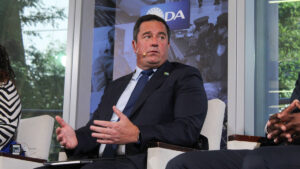South Africans have a big debt problem
While South Africa’s credit landscape has improved through digital innovation and greater access, many consumers still struggle with debt due to poor financial literacy.
RCS deputy CEO Mariné van Brakel explained to Daily Investor that the current credit landscape in South Africa presents a mixed picture.
“On the positive side, there have been significant strides in expanding access to formal credit channels and embracing digital innovations,” she said.
These advancements and heightened efforts to improve financial education are helping many consumers make more informed decisions about borrowing and managing their finances.
RCS has also noted some other credit trends which are prevalent at the moment. For example, younger consumers are favouring new credit products such as ‘Buy Now, Pay Later’ services because of their simplicity and transparency.
“We’ve also seen a growing adoption of alternative payment methods, such as consumers purchasing vouchers and using them as a form of payment to buy products or services,” Van Brakel said.
“The digital revolution has continued to reshape credit markets, with digital wallets, embedded payment platforms, and super apps gaining significant traction.”
However, challenges persist. Economic pressures, global uncertainty, and inadequate financial literacy mean that many South Africans have difficulty responsibly managing credit.
These conditions can sometimes drive individuals toward high-interest or unregulated sources of credit without fully understanding the consequences of their actions.
This could include predatory lenders like loan sharks, which are unlicensed moneylenders who charge very high interest rates and sometimes use threats and violence to frighten people who can’t repay their loans.
Many South Africans lack exposure to financial literacy programmes that could equip them with the tools they need to make informed budgeting and debt management decisions.
On top of this, they might also not be aware of the various regulated credit options which are currently available to them.
Building financial literacy

“We believe it remains crucial for consumers to understand their income, expenses and saving potential to ensure they know what they can afford,” Van Brakel said.
This is valuable because it ensures they find the most suitable credit products and seek trustworthy advice before taking out credit or loans.
“Many South Africans face challenges in managing their credit largely due to insufficient financial education and inadequate levels of financial literacy,” she said.
“Often, individuals are not equipped from an early age with the tools to understand budgeting, saving, and the responsible use of credit.”
Van Brakel explained that borrowing and credit management misconceptions can develop without a strong foundation in these areas, leading to difficulties later in life.
“Educating children early on is crucial; instilling smart money habits from a young age can pave the way for a lifetime of sound financial decision-making,” she said.
This long-term approach to financial literacy can help build a more resilient and informed consumer base nationwide.
Although progress is evident, the market still requires sustained efforts from financial institutions, policymakers, and educators to build a more inclusive and resilient credit environment.
While continued investment in financial education is also essential to support this progress, there are also steps South Africans can take to manage their credit independently.
How to improve your credit

According to Van Brakel, there are several practical and simple steps consumers can take to improve their credit scores.
First, check your credit score. This will help you ensure you’re diligently servicing your debt, using credit responsibly, and catching any errors early on.
Van Brakel said South Africans can improve their financial standing by using credit to their advantage and understanding how credit scores work and what affects them.
“Keeping track of this will help you ensure that you’re servicing your debt diligently, using credit responsibly and catching any errors early on,” she said.
Knowledge is power, and armed with this insight, South Africans can make informed choices. This will drive further financial literacy education, which is key to South Africans’ taking control of their credit health.
“Regular monitoring helps you stay informed about your credit health and enables you to identify any discrepancies or potential signs of fraud early on,” Van Brakel said.
If you plan to apply for a loan, credit card, or any other form of credit, consider checking your score a few weeks before your application.
This proactive approach allows you to address any issues affecting your creditworthiness, ensuring you’re in the best possible position when applying for new credit.
Van Brakel explained that a credit score is shaped by several key factors, including:
- Payment history: This is essential, as consistently making the minimum repayments on time demonstrates positive financial habits. You can set up automatic debits or reminders to avoid your score being negatively impacted by late or missed payments.
- Credit utilisation: This measures the amount of available credit you’re using, calculated by comparing your outstanding balance to your total credit limit.
- Length of credit history: The longer your credit history, the better, as it provides a track record of how you handle debt over time. To build up a credit history, start small by applying for credit products like a store card or a personal loan.
- Recent credit applications: Applying for multiple new accounts or loans within a short period can be considered risky behaviour and may negatively impact your score.
“Once you know where you stand, the next step is to ensure you always make repayments on time and work towards reducing outstanding debt as quickly as possible,” Van Brakel added.
By budgeting effectively, planning your spending, and avoiding unnecessary credit applications, you can steadily build a stronger credit profile.
Next up, Van Brakel suggested that consumers should declutter their credit by consolidating their accounts. Not only will this be easier to manage, but it will be cheaper as well.
If you have multiple credit accounts for items like clothing, groceries, luxury goods, or electronics, you could be paying unnecessary account and transaction fees.
Consolidating these into one account that offers access to many outlets through a single credit facility can help you save money.







Comments